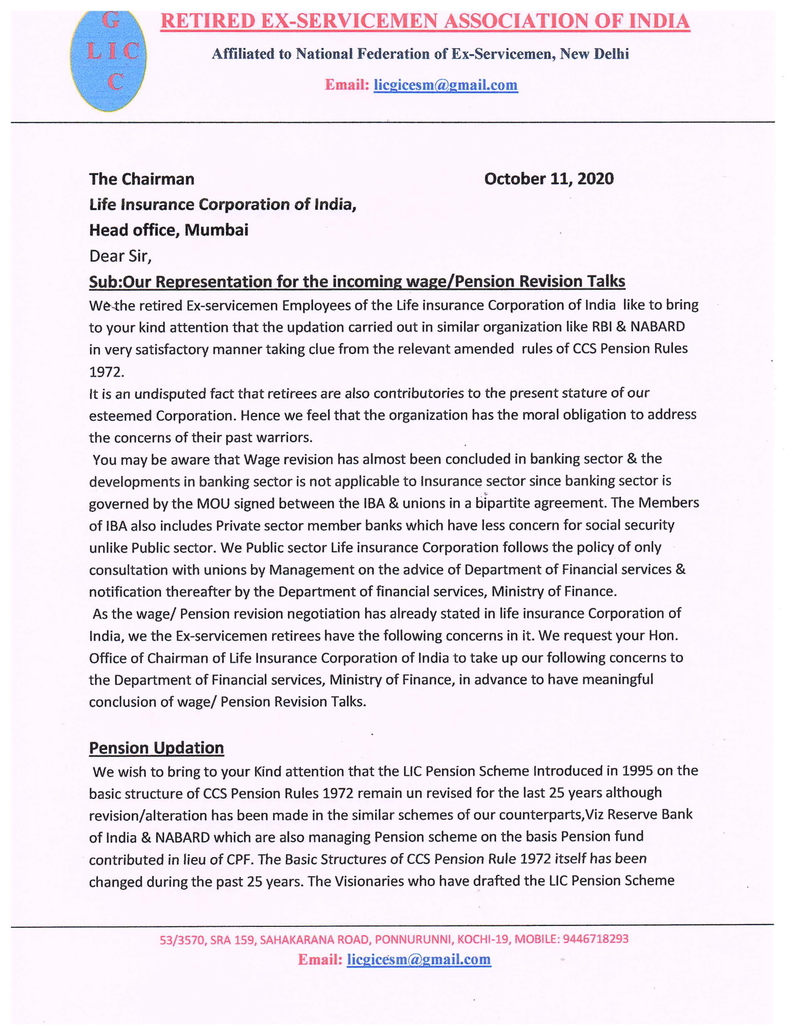ALL INDIA BANK OFFICERS’ CONFEDERATION (AIBOC)ALL INDIA BANK OFFICERS’ ASSOCIATION (AIBOA)
INDIAN NATIONAL BANK OFFICERS’ CONGRESS (INBOC)
NATIONAL ORGANIZATION OF BANK OFFICERS (NOBO)
Kolkata
Date: 03.10.2020
The Convenor
United Forum of Bank Unions
Dear Comrade,
UPDATION OF PENSION AND OTHER RELATED ISSUES
You
are aware that updation of pension for bank retirees is a key issue
taken up by UFBU in various forums. All the constituents of UFBU are
genuinely concerned about the issue of updation of pension. In this
context, we place on record our appreciation for the determined pursuit
of the same by your good office, on behalf of all constituents during
discussions with IBA. While an announcement was made by IBA Chairman
Shri Rajnish Kumar ji on 22nd July’20 during the signing of the MOU that
family pension would be revised (30% of last drawn pay without any
ceiling), IBA is silent about the progress of updation of pension.
02.
As the 11th Bipartite is nearing conclusion, we wish to table certain
facts concerning the entire approach of updation of pension.
a)
In the background RBI introducing, the Pension in place of Contributory
Provident Fund (CPF) with effect from 01.01.1986, the unions in our
Industry felt the need of demanding the same for its implementation in
Public Sector Banks.
b) After thorough working and analysing
the pros and cons, an MOU was signed on 20th May, 1993, which was
converted into a full settlement under ID Act on 29th October 1993 and
joint notes were signed by officers’ organisations too on the same day.
c)
The scheme was gazetted by the Government of India in September 1995
and the option was extended to all, who had not exercised earlier.
d)
In the year 2001, a special VRS was introduced by the Banks. Nearly
1,25,000 people opted for the said scheme in which 20% were officers,
who had opted for Pension and opted out from the services.
e)
They were paid Commutation as well as Pension from the date of their
severance together with compensation for the left-over service with a
maximum of 60 months’ Salary.
f) This led to the depletion of funds in the pension Corpus as well as interest accrued on the fund.
g)
Banks had not sufficiently funded the Pension Corpus and on the
contrary, the Banks got the sanction the payouts amortised over 5 years
from RBI.
h) In the settlements entered into during 2000 and
2005, negotiating unions were agreeable to apportion certain percentage
from the agreed amount towards the pension corpus.
i) In 2010,
severe pressure was exerted by the Unions to secure Pension in the
original form and accordingly, a committee was constituted with
representatives of 9 unions with two actuaries – one from Hyderabad and
another from Kolkata, to arrive at the quantum required to extend the
option. Incidentally, IBA and Government had pegged the amount required
at Rs 26000 crore. Following the findings of the actuaries, the quantum
was scaled down to Rs 6000 crore.
j) It was agreed between the
parties that an amount of Rs 4200 crore would be provided by the
management and Rs 1800 crore should be borne by the new pension seekers.
k) Against the agreed understandings, there are several legal disputes raised by the associations/individuals.
l)
From 2005 onwards, the concept of AS-15 was introduced in Accounting
Standards by The Institute of Chartered Accountants of India (ICAI),
according to which every bank is required to make mandatory provisioning
for pension funds every year.
m) Now, RBI in consultation
with Government of India updated Pension with effect from 05.03.2019,
the DA index of 4440 points being taken as the point of merger and
accordingly the pension has been updated for all retirees without
payment of any arrears. Similar exercise has also been implemented in
NABARD very recently.
n) While extending the first and second
option of pension in 1995 and 2010 the employees who had resigned from
the service of the bank were not made eligible to opt for the pension,
even though they had put in more than 20 years of qualifying service,
the Service Regulations / Service Rules / Settlements do not disentitle
such employees from receiving superannuation benefits and in case of
bank employees, there is no difference between resignation or voluntary
retirement, with regard to notice period, provision for acceptance of
notice and
other terminal benefits like Provident Fund and Gratuity are applicable and leave encashment is also eligible for
both the categories of employees/officers. Considering that number of such employees is very few in the
banking industry, the resignees constitute the category that is being unlawfully denied the pension
option by the banks even after passage of two-and-half decades since the penning of the pension
agreement in the banking industry.
o) For the family pension, the findings of the actuary engaged by AIBOC was given due cognizance
by IBA. Under the circumstances, for arriving at the cost of updation of pension also, UFBU should
insist on appointment of two more actuaries in order to estimate and examine adequacy of the
existing corpus for such updation. IBA should also provide the required data in a specified format
as would be required by the actuaries.
p) While we continue to rake up the issue and stand firm for pension updation, we should also
simultaneously insist that the pension / family pension of the pre 1986 retirees should also be
properly upgraded, who are few in numbers.
We, therefore, propose focusing on the above issues in the ensuing discussion under the 11th Bipartite
settlement.
Stay safe stay healthy.
With greetings,
Yours sincerely,
General Secretary General Secretary General Secretary General Secretary
AIBOC AIBOA INBOC NOBO





